Cite this document
(“Global Media: Flows and Counter-flows Essay Example | Topics and Well Written Essays - 1500 words”, n.d.)
Retrieved from https://studentshare.org/sociology/1517349-global-media-flows-and-counter-flows
Retrieved from https://studentshare.org/sociology/1517349-global-media-flows-and-counter-flows
(Global Media: Flows and Counter-Flows Essay Example | Topics and Well Written Essays - 1500 Words)
https://studentshare.org/sociology/1517349-global-media-flows-and-counter-flows.
https://studentshare.org/sociology/1517349-global-media-flows-and-counter-flows.
“Global Media: Flows and Counter-Flows Essay Example | Topics and Well Written Essays - 1500 Words”, n.d. https://studentshare.org/sociology/1517349-global-media-flows-and-counter-flows.


